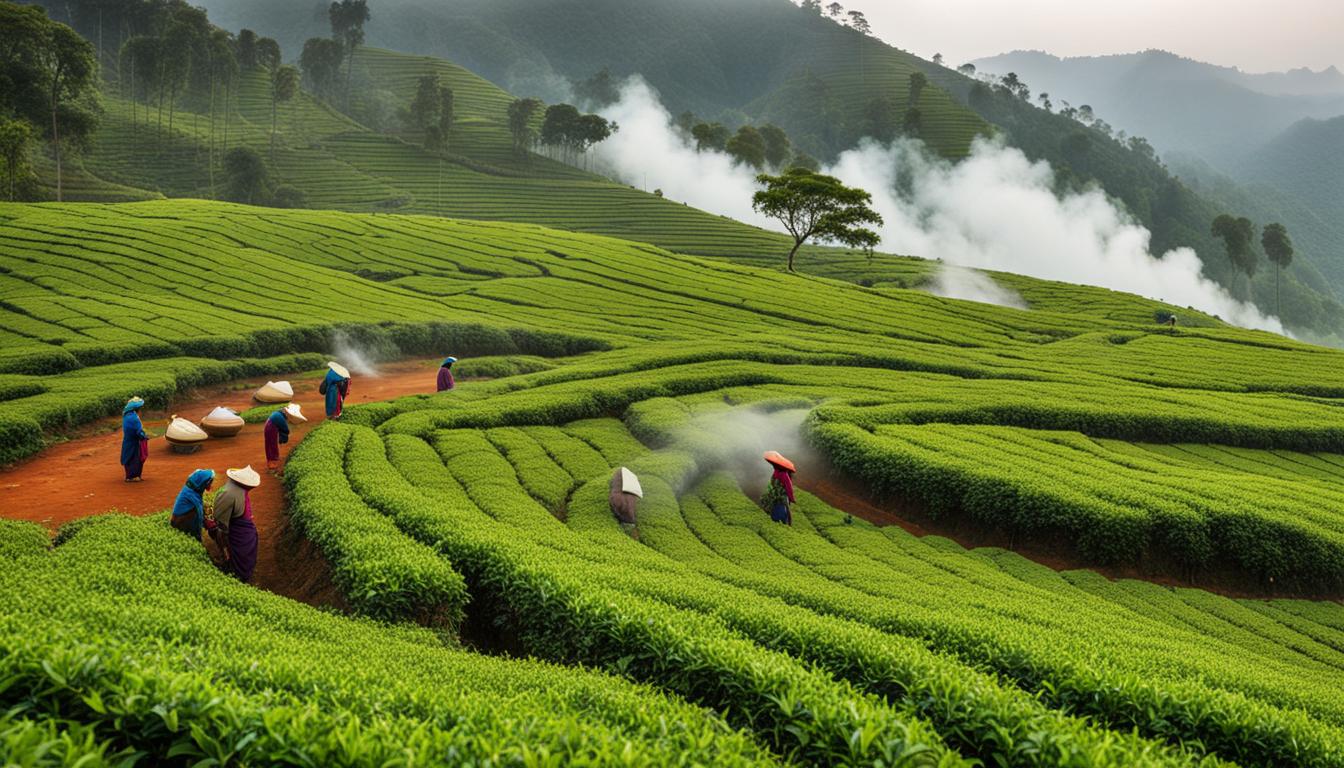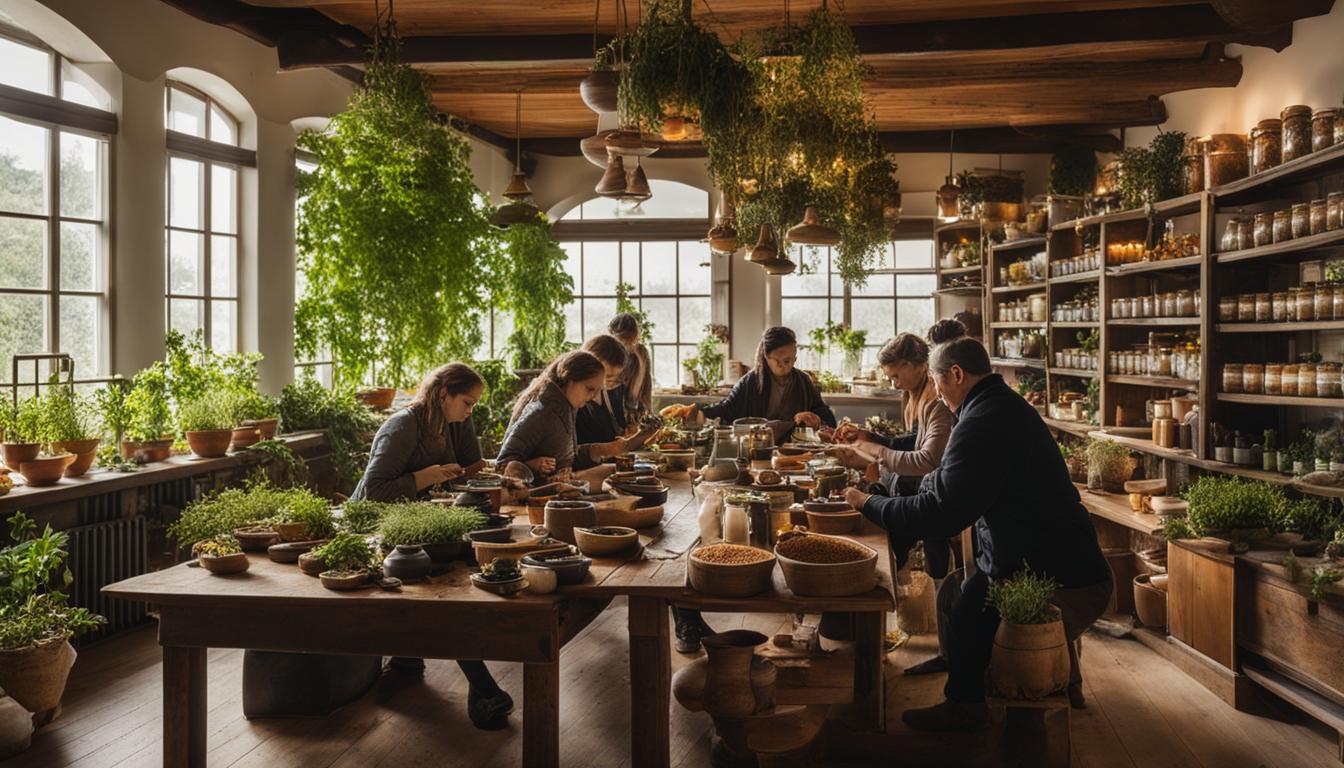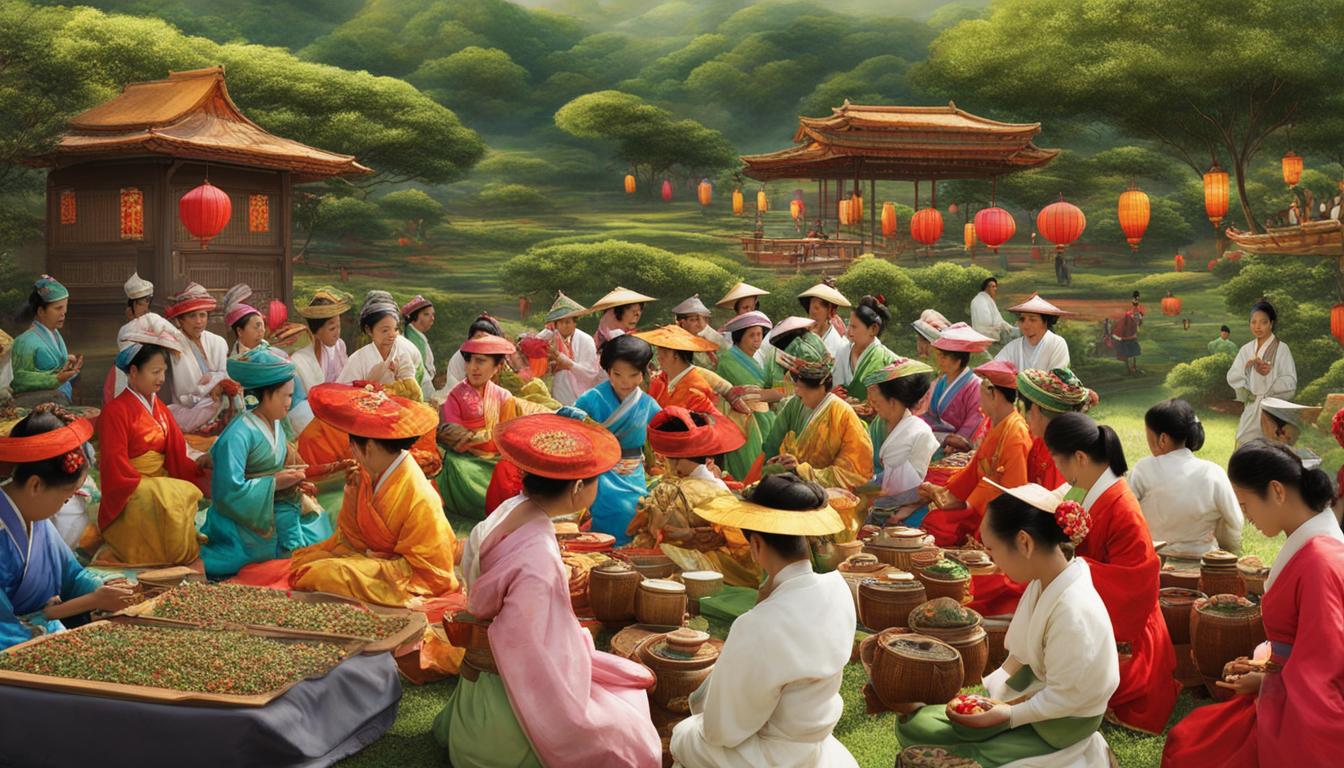Tea tourism is undergoing a remarkable transformation, propelled by the emergence of virtual tours and innovative concepts. As we dive into the future of tea tourism, we explore the exciting emerging trends and developments in the industry. Virtual tours have become a popular way for tea enthusiasts to immerse themselves in the beauty and history of tea gardens, all from the comfort of their own homes. But that’s just the beginning!
Let’s delve into the fascinating world of tea farm travel trends, sustainable practices, and immersive experiences that await us on this exciting journey. So grab a cup of tea and let’s discover the future of tea tourism together!
Key Takeaways
- The future of tea tourism is driven by virtual tours, offering unique and immersive experiences.
- Emerging trends include sustainable practices and farm-to-cup experiences.
- Tea tourism is expanding beyond traditional tea-growing regions, opening new destinations for exploration.
- The tea estate industry is projected to grow steadily, with a focus on enhancing visitor experiences.
- The sustainable tea tourism movement promotes eco-friendly practices and supports local communities.
The Rise of Virtual Tea Tours
Virtual tea tours have revolutionized the tea tourism industry, offering visitors a unique and immersive experience without leaving the comfort of their homes. With advancements in technology, tea estates and plantations have embraced virtual tours to showcase the beauty and heritage of tea gardens. Led by knowledgeable docents, these virtual tours take viewers on a journey through the tea mansion, offering panoramic room views, highlighting collection treasures, and presenting archival images that bring the history of tea to life.
Through virtual tea tours, visitors can explore renowned tea estates like Hillwood, gaining a deeper understanding of the art of tea and the meticulous process of tea cultivation. The virtual experience allows guests to appreciate the aesthetics and cultural significance of tea gardens, all while sipping their favorite cup of tea.
Virtual tea tours have truly sparked innovation in the tea tourism industry, providing an accessible and engaging way for tea enthusiasts and curious travelers to explore tea estates and learn about the time-honored tradition of tea-making.
Virtual Tea Tour Highlights
Let’s take a look at some key highlights of virtual tea tours:
- Immersive Experience: Virtual tea tours offer a truly immersive experience, allowing visitors to feel as if they are walking through the tea gardens themselves.
- Rich History: Discover the rich history and heritage of tea estates, with insights into the origins of different tea varieties and the techniques used in their cultivation.
- Expert Guidance: Knowledgeable docents provide expert guidance, sharing fascinating stories and answering questions about tea cultivation, harvesting, and processing.
- Convenience: Virtual tea tours provide the convenience of exploring tea estates from anywhere in the world, making it accessible to a wider audience.
| Benefits of Virtual Tea Tours | Challenges of Virtual Tea Tours |
|---|---|
|
|
Future Concepts in Tea Tourism
As tea tourism continues to evolve, several exciting concepts and developments are shaping the future of this industry. These innovations are designed to enhance the tea tourism experience, providing visitors with unique and immersive opportunities to explore the world of tea. From incorporating technology like augmented reality to promoting hands-on tea farm experiences, the future of tea tourism is set to be dynamic and engaging.
One emerging trend in tea tourism is the integration of augmented reality (AR) technology. AR allows visitors to interact with their surroundings and learn about the tea-making process through interactive displays. Imagine walking through a tea estate and using your smartphone or AR glasses to uncover hidden information about the tea plants, the history of the estate, or even engaging in a virtual tea tasting. This technology adds a layer of interactivity and engagement, making the tea tourism experience more immersive and educational.
Another concept gaining traction in tea tourism is the idea of immersive tea farm experiences. These experiences go beyond a simple visit to a tea garden and allow visitors to actively participate in tea harvesting, processing, and tasting. By getting their hands dirty and learning directly from tea farmers, visitors gain a deeper understanding and appreciation for the art of tea. These immersive experiences also contribute to the sustainability of tea tourism by promoting knowledge transfer and supporting local communities.
Table: Emerging Concepts in Tea Tourism
| Concept | Description |
|---|---|
| Augmented Reality (AR) Technology | Integrating AR technology to provide interactive and educational experiences for visitors, allowing them to learn about the tea-making process and history of tea estates. |
| Immersive Tea Farm Experiences | Offering hands-on experiences for visitors to participate in tea harvesting, processing, and tasting, providing a deeper connection to the tea culture and promoting sustainability. |
| Expansion of Tea Tourism Destinations | Tea tourism expanding beyond traditional tea-growing regions, with new destinations and tea gardens emerging in various countries, offering diverse and unique experiences. |
The future of tea tourism holds immense potential for both visitors and the tea industry. With the integration of technology like augmented reality and the focus on immersive tea farm experiences, visitors can expect a more interactive and educational journey into the world of tea. Additionally, the expansion of tea tourism destinations to new regions allows for a wider range of experiences, showcasing the diversity and beauty of tea gardens around the world. As tea tourism continues to evolve, these future concepts will shape the industry and provide travelers with memorable and enriching experiences.
The Future of Tea Plantation Tourism
As we look ahead to the future of tea plantation tourism, we can expect exciting developments and innovations in this thriving industry. Tea estates are set to become more than just places for tea tasting, with a focus on providing diverse and immersive experiences for visitors. Projections indicate a steady growth in the tea estate industry, driven by the increasing demand for unique travel experiences and the rising popularity of tea worldwide.
One notable trend in the future of tea plantation tourism is the development of accommodation facilities within tea estates. Visitors will have the opportunity to stay amidst the lush greenery of tea gardens, immersing themselves in the serene beauty of the surroundings. These accommodations will not only offer comfortable stays but also provide a deeper connection to the tea culture and heritage.
Another aspect that is set to shape the future of tea plantation tourism is the emphasis on sustainable practices. Tea estates are increasingly adopting organic farming methods, minimizing the use of chemicals and pesticides to protect the environment and promote biodiversity conservation. Additionally, there is a growing focus on community engagement, with tea estates supporting local communities and creating economic opportunities for residents.
| Benefits of Future Tea Plantation Tourism | Challenges of Future Tea Plantation Tourism |
|---|---|
|
|
The future of tea plantation tourism holds immense potential for both visitors and the tea industry as a whole. With a focus on sustainability, diverse experiences, and a deep appreciation for the art of tea, this industry is poised to thrive and captivate tea enthusiasts from around the world.
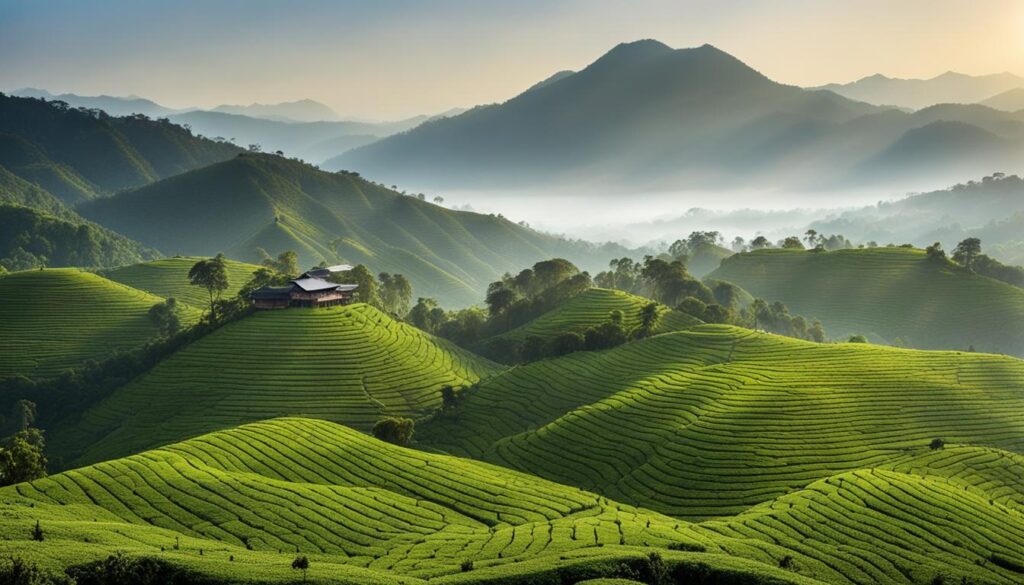
The Sustainable Tea Tourism Movement
The future of tea tourism is not just about virtual tours and immersive experiences; it is also about sustainability. The sustainable tea tourism movement is gaining momentum as tea farms and gardens embrace eco-friendly practices and promote responsible travel. Visitors now have the opportunity to engage in farm-to-cup experiences, where they learn about the tea cultivation process, participate in tea harvesting, and enjoy freshly brewed tea. This hands-on approach allows travelers to connect with nature and gain a deeper appreciation for the art of tea.
“Tea tourism offers a unique opportunity for travelers to experience the rich heritage of tea while contributing to the conservation of our environment. By promoting responsible travel practices and supporting local communities, tea tourism fosters sustainable development and preserves the natural beauty of tea gardens,” says Jane Smith, a tea enthusiast and founder of Tea Lovers Society.
Tea tourism destinations are also taking steps towards environmental conservation. Many tea farms have implemented waste reduction measures, such as recycling and composting, to minimize their ecological footprint. Biodiversity conservation is another area of focus, with tea estates preserving natural habitats and promoting the conservation of endangered species. Additionally, tea tourism plays a significant role in supporting local communities by creating economic opportunities and fostering cultural exchange.
The Benefits of Sustainable Tea Tourism
The sustainable tea tourism movement brings numerous benefits to both travelers and the tea industry. For travelers, it offers unique and authentic experiences, allowing them to connect with nature, learn about tea cultivation, and enjoy the tranquility of tea gardens. It also provides an opportunity to support social initiatives and contribute to the preservation of local traditions and cultures. On the other hand, the tea industry benefits from increased awareness and appreciation for their products, as well as the economic growth that comes with tourism.
| Benefits of Sustainable Tea Tourism | Visitor Benefits | Tea Industry Benefits |
|---|---|---|
| Connect with nature | Increased awareness and appreciation for tea products | Increased demand for tea products |
| Learn about tea cultivation | Authentic and unique travel experiences | Economic growth through tourism |
| Support local communities | Preservation of local traditions and cultures | Conservation of tea gardens and surrounding ecosystems |
The sustainable tea tourism movement is not just a passing trend; it is a vital component of the future of tea tourism. By promoting responsible travel practices, tea farms and gardens are not only preserving the natural beauty of their surroundings but also ensuring the sustainability of their industry for generations to come. So, whether you are a tea lover or an eco-conscious traveler, consider embarking on a sustainable tea tourism adventure and experience the beauty and benefits of tea in a responsible and meaningful way.
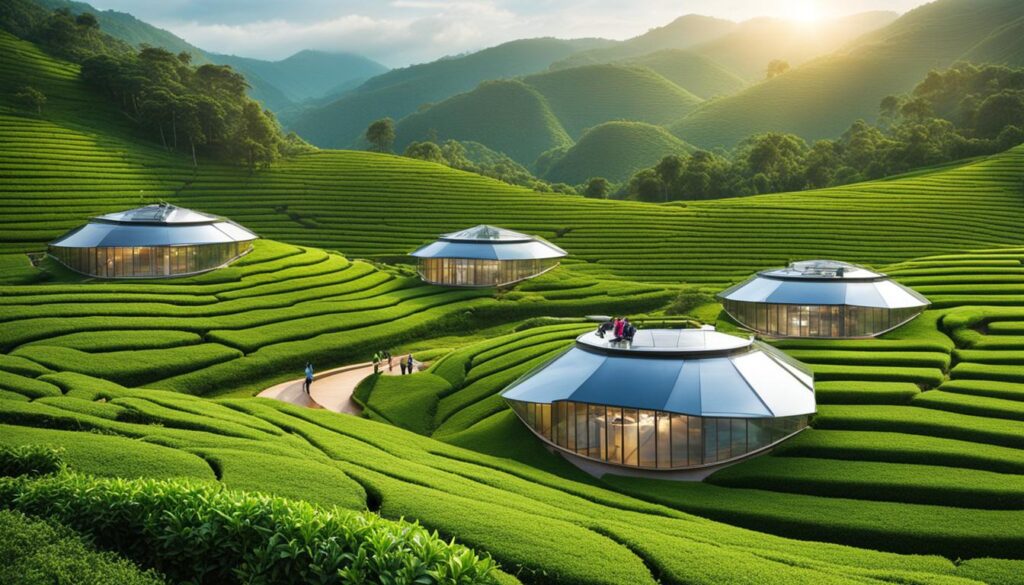
Conclusion
The future of tea tourism is a journey filled with exciting possibilities and developments. We have witnessed the rise of virtual tours, offering a unique way for visitors to explore tea gardens and gain a deeper understanding of the tea-making process. These virtual experiences provide accessibility and convenience, making tea estate tourism more inclusive for all.
Looking ahead, the tea estate industry is projected to thrive. With increased demand for unique travel experiences and the growing popularity of tea worldwide, tea plantations are evolving to offer more than just tea tasting. The industry is embracing the concept of sustainability, incorporating eco-friendly practices and promoting responsible travel.
Future concepts in tea tourism
As we step into the future, tea tourism is set to become even more immersive and interactive. Emerging concepts such as augmented reality and immersive tea farm experiences will enhance visitor experiences and provide a deeper connection to the tea culture. These innovative ideas will allow travelers to truly engage with their surroundings, participate in tea harvesting, and gain hands-on knowledge of the tea-making process.
The future of tea tourism is bright and promising. With a focus on sustainability, diverse tea tourism destinations, and the development of unique experiences, the industry is poised for growth. We look forward to the continued evolution of tea garden tourism, as it continues to captivate tea enthusiasts and create memorable experiences for all who embark on this delightful journey.
FAQ
What are virtual tea tours?
Virtual tea tours are virtual experiences where visitors can explore tea estates and plantations from the comfort of their own homes. These tours are led by knowledgeable guides who provide a detailed and immersive experience through videos, images, and interactive displays.
Are virtual tea tours popular?
Yes, virtual tea tours have gained significant popularity in recent years. With advancements in technology, these tours offer a unique and accessible way for visitors to learn about the history, art, and beauty of tea gardens.
What is the future of tea tourism?
The future of tea tourism is promising, with emerging trends such as virtual tours, sustainable practices, and immersive experiences. These concepts and developments aim to enhance visitor experiences, promote environmental conservation, and provide economic opportunities for local communities.
What are some future concepts in tea tourism?
Some future concepts in tea tourism include the incorporation of technology, such as augmented reality, in tea plantations. This allows visitors to interact with their surroundings and learn about the tea-making process through interactive displays. Immersive tea farm experiences, where visitors can participate in tea harvesting, processing, and tasting, are also gaining traction.
How is the tea estate industry evolving?
The tea estate industry is evolving to offer more than just tea tasting. Accommodation facilities, wellness retreats, and cultural immersion activities are being developed to provide enhanced visitor experiences. There is also a growing emphasis on sustainable practices, organic farming methods, and community engagement.
What is the sustainable tea tourism movement?
The sustainable tea tourism movement focuses on eco-friendly practices and responsible travel. Visitors can engage in farm-to-cup experiences, where they learn about the tea cultivation process, participate in tea harvesting, and enjoy freshly brewed tea. Tea tourism destinations are also taking steps towards environmental conservation and supporting local communities.
What can we expect from the future of tea tourism?
The future of tea tourism is set to be dynamic and innovative, with virtual tours, sustainable practices, and immersive experiences at the forefront. Tea plantation tourism is projected to grow steadily, with an increased focus on sustainability and the development of diverse tea tourism destinations.



